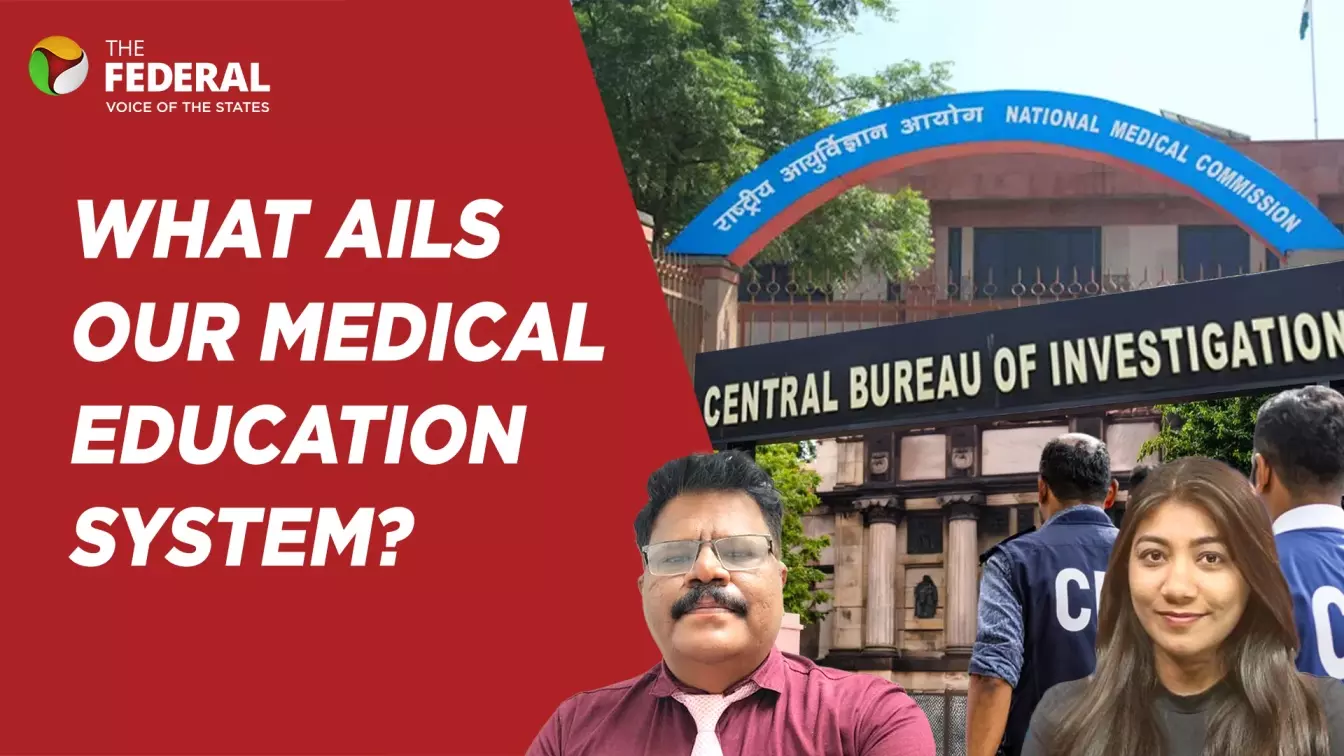
In conversation with The Federal, Dr C Sundaresan, President of the Government All Doctors Association, lays out how the failures in the system impact medical education, healthcare delivery, and what urgent steps are needed to rebuild trust.
CBI uncovers massive corruption in India’s medical education system
Probe has revealed shocking corruption within the National Medical Commission and Union Health Ministry, with bribes allegedly exchanged for approval of substandard medical colleges

A major scam uncovered by the Central Bureau of Investigation (CBI) has revealed shocking corruption within the National Medical Commission (NMC) and the Union Health Ministry, where bribes were allegedly exchanged for approvals of substandard medical colleges. In conversation with The Federal, Dr C Sundaresan, President of the Government All Doctors Association, lays out how these failures impact medical education, healthcare delivery, and what urgent steps are needed to rebuild trust.
What are the key lapses exposed in this CBI investigation into medical college licensing?
What the NMC essentially does is assess whether a medical college applying for seats is fit to train students. They look at the faculty strength, infrastructure, and patient load. However, they inspect colleges at a single point in time using part-time assessors - faculty members from other institutions - who are chosen randomly to maintain anonymity.
Also Read: Doctors threaten indefinite strike against National Medical Commission Bill
The idea is that this surprise element prevents manipulation. But in this case, insiders from within the NMC leaked inspection schedules and assessor lists. This allowed certain colleges to forge documents, stage infrastructure, or inflate faculty numbers. The result? Many colleges without the required infrastructure or patient load have been granted approval. This is a serious lapse.
How did outsiders - middlemen - manage to infiltrate such a critical system?
The CBI probe highlights how these middlemen had access to internal NMC data. They worked as facilitators between medical colleges and insiders at the NMC. This means approvals were manipulated without real compliance with norms. When colleges that lack infrastructure or qualified faculty are allowed to operate, the quality of doctors being produced drops drastically. This endangers patients and damages the credibility of Indian medical education.
What structural weaknesses in the NMC allowed this to happen?
The NMC has introduced some good initiatives - like facial recognition and location-based apps to verify faculty presence. They’re also looking at Aadhaar-based patient tracking. But the issue is poor execution. There is no standard operating procedure applied uniformly across such a diverse country.
Also Read: "National Medical Commission will bring great transparency," says PM Modi
The commission keeps experimenting through a trial-and-error approach. They introduce systems, run them, and only later fix what doesn’t work. By the time a flaw is noticed and corrected, they often abandon the system and start over. This inconsistent and chaotic approach creates room for malpractice.
The NMC has halted all approvals for the upcoming academic year. Is that the right decision?
No, I don’t agree with that move. Blanket bans on seat increases or renewals will hurt the healthcare system and disrupt state-level doctor workforce planning. Each state depends on these projections to plan its healthcare infrastructure.
Also Read: Medical commission replaces MCI, will regulate medical education fee
Instead of freezing approvals across the board, the NMC should conduct fresh inspections. They can verify the faculty, patient load, and infrastructure using surprise checks. There are better ways to identify and eliminate malpractice without halting the entire system.
What should be done now to ensure quality and accountability in medical licensing?
The NMC must streamline its processes. Reforms should not be introduced through trial-and-error on active colleges. They need clear SOPs developed through consultation and expert review. These protocols must be tested before implementation, not while the system is already running.
Also, any change in standards or evaluation criteria should remain stable for at least one academic year. Frequent changes confuse institutions and open avenues for manipulation. The NMC must move from reactionary firefighting to proactive governance.
Also Read: Parliamentary panel wants NMC to study other countries’ best practices
What kind of action do you expect from the Union Health Ministry, given that its officials are also implicated?
This scam spans six states and involves Union Health Ministry personnel. So the onus is on senior authorities to not only clean house but also ensure that the regulatory framework regains public trust.
There must be independent audits, stricter digital protocols for inspection data, and perhaps even oversight from a separate neutral body. Accountability should not stop at junior officers or assessors - it must go all the way up.
(The content above has been generated using a fine-tuned AI model. To ensure accuracy, quality, and editorial integrity, we employ a Human-In-The-Loop (HITL) process. While AI assists in creating the initial draft, our experienced editorial team carefully reviews, edits, and refines the content before publication. At The Federal, we combine the efficiency of AI with the expertise of human editors to deliver reliable and insightful journalism.)

